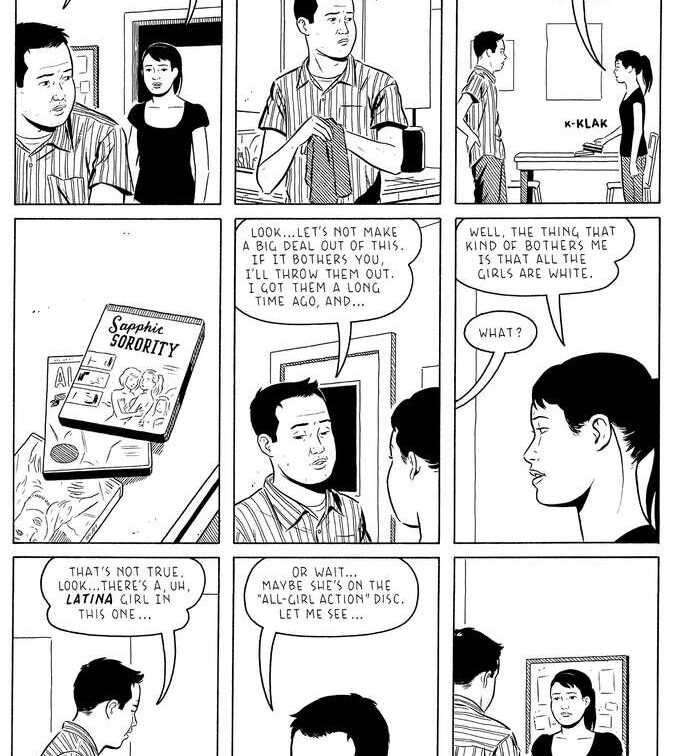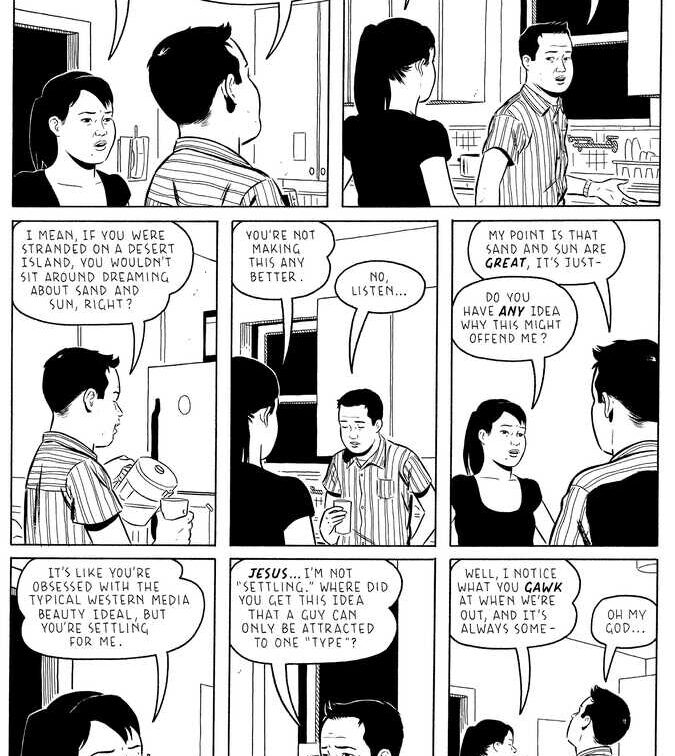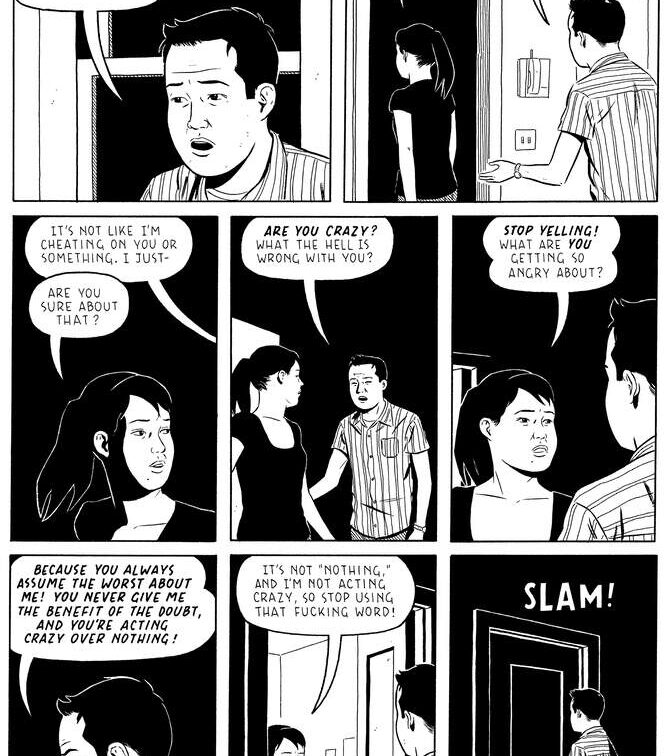Ben Tanaka, the anti-hero of Adrian Tomine’s bleakly hilarious graphic novel Shortcomings (2007), has a secure place in the great American literary tradition of bad boyfriends. This is a crowded lineage that runs from Ernest Hemingway’s Nick Adams to Norman Mailer’s Stephen Rojack, from Saul Bellow’s Moses Herzog to John Updike’s Harry “Rabbit” Angstrom. Philip Roth just by himself created a veritable squadron of undesirable mates—chief among them Alexander Portnoy, Nathan Zuckerman, and the incandescently wicked Mickey Sabbath.
These are all viscerally authentic characters, who possess the tactile roundedness of reality, and who are undeniably wretched romantic partners. The women in their lives have to deal with the fact that these men are, in various combinations: dishonest, self-centered, touchy, obtuse, neglectful, unfaithful, or abusive. Tomine’s superb graphic novel already ensured that Ben Tanaka deserves a spot on this disreputable pantheon of cads. Now Tanaka is about to achieve cinematic immortality thanks to a solid just-released film adaptation, also titled Shortcomings, written by Tomine and directed by Randall Park.
In a provocative 1997 essay for The New York Observer, the late David Foster Wallace decried Mailer, Updike, and Roth as “the Great Male Narcissists” and “literary phallocrats.” Wallace was hardly the first to make this point, a frequent contention of feminist criticism since the 1960s, although Wallace’s own high literary reputation (and perhaps, ironically, his maleness) gave his essay a wide impact. The argument always struck me as half-true. “Great male narcissists” certainly describes these writers in their personal lives, and also the protagonists they created. But life and art are deserve to be disentangled. If these writers (most notoriously Mailer in his 1971 anti-feminist polemic The Prisoner of Sex) were sometimes explicit idealogues of patriarchy, their fiction told more complex stories where the price of toxic masculinity was delineated with caustic vividness.
Ben Tanaka, created when the Mailer/Updike/Roth trinity were in the twilight of their lives, is a phallocrat for a new era. It’s much harder in the 21st century—unless you’re willing to become an incel crank who watches Jordan Peterson YouTube videos—to be as haughtily dismissive of feminism as Mailer was. Tanaka’s misdeeds are subject to withering and hard-to-answer criticism, not just from former lovers but also from his best friend.
Tanaka is Japanese America and most of the characters in Shortcomings are also of Asian descent. This puts Tanaka’s actions in a distinct cultural context. Tanaka’s troubles with women are intertwined with his ethnic self-hatred. Tanaka has bought into the cultural mythology of Asian male sexual inadequacy and fetishizes blond white women as sexual objects. The title Shortcomings refers not just to Tanaka’s personal failures but also his self-destructive acceptance of a racialized sexual hierarchy. This breeds its own form of neurosis and self-sabotage. Tanaka is a phallocrat who has wilted.
Popular
"swipe left below to view more authors"Swipe →
This thematic linkage of ethnic self-hatred with sexual inadequacy aligns Shortcomings with the work of Philip Roth, particularly the three novels and long story about Nathan Zuckerman collected in the volume Zuckerman Bound (1985). Zuckerman—like Roth, a successful novelist—is accused, somewhat unfairly, of being a self-hating Jew by an informal consortium of rabbis, communal elders, and literary critics. Zuckerman doesn’t hate his fellow Jews. But he does love needling and provoking them, even imagining a scenario where he marries an Anne Frank who survives the Holocaust. Yet, even as Zuckerman rejects the accusation, he’s aware that his pursuit of a literary vocation puts him at odds with the ties of family and ethnicity. His relentless pursuit of shiksas shows this conflict playing out in a sexual realm. Eventually, he suffers from writer’s block and impotence. In the film version of Shortcomings, Tanaka displays an even more thwarted artistic vocation, lacking the will to even start the screenwriting career he dreams of. Part of Tanaka’s pathos is that he possesses the critical intelligence an artist needs, without (it seems) enjoying the attendant creative urge that is also essential. He’s rightfully scornful of various sentimental and kitsch works of art he encounters, but is incapable of producing an alternative.



Randall Park’s film largely does justice to Tomine’s fraught and challenging story of dating mores in a multiracial society. Thanks to Tomine’s script, the film follows most of the book’s narrative beats, with cultural and political references brought up to to date. The casting is the great strength of the film: Justin H. Min perfectly inhabits Ben Tanaka, capturing his blinkered pride and defensive sarcasm. But in both the graphic novel and film, Shortcomings is not a story about Ben alone. In fact, part of what makes him so frustratingly myopic is that he fails to ever realize that the women in his life have parallel struggles. Ally Maki is touchingly troubled and resilient as Ben’s girlfriend Miko. Sherry Cola gives a live-wire performance as Ben’s snarky confidant, Alice, who has a parallel struggle with denial of her own sexual identity but learns to move on.
The major transformation from graphic novel to film is in the palette. While the graphic novel was in stark black and white, the film is not only in color but actively vibrant. This shift in palette is no small matter, as it transforms the mood of the story. The harsher edges of the graphic novel are sanded over, with the cinematic Tanaka being given a clearer path to redemption than the original story allowed.
As a cartoonist, Adrian Tomine is in the tradition of chiaroscuro realism, a line that began with newspaper cartoonists Noel (Scorchy Smith) Sickles and Milton (Terry and the Pirates) Caniff, who shared a studio in the 1930s and together forged a style that used heavy black splotches to convey a noir world. This style was widely imitated—not least by comic book maestros like Alex (Zorro) Toth and Jaime (Love and Rockets) Hernandez. Tomine has refined this style, bringing to it his own impeccable eye for composition. Every panel in his work is expertly framed, creating his characteristic style of elegance fused with anxiety.
The movie Shortcomings lacks Tomine’s visual intensity. Despite this loss, it’s a fine film. I suspect it’ll spark many heated conversations about race, ethnic self-hatred, and sex. If so, I also hope it brings more readers to the graphic novel.


